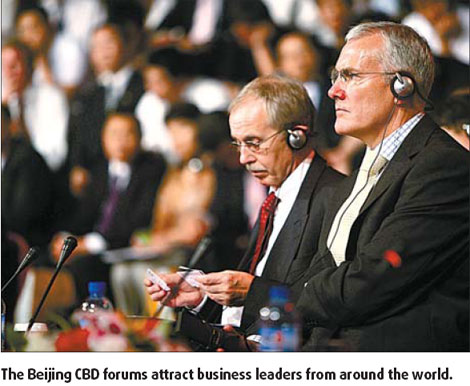|
![A view of the Beijing CBD at night, featuring landmark buildings and multiple forms of transport. [China Daily] A view of the Beijing CBD at night, featuring landmark buildings and multiple forms of transport. [China Daily]](http://images.china.cn/attachement/jpg/site1007/20080807/0011111fa1560a04cbcf01.jpg)
|
|
A view of the Beijing CBD at night, featuring landmark buildings and multiple forms of transport. [China Daily]
|
The Beijing Central Business District (CBD) occupies 3.99 sq km of the Chaoyang district on the east side of the city. It is conveniently equidistant to Tian'anmen Square, the Beijing Capital International Airport expressway and the Beijing-Tianjin-Tangshan expressway.
In the eight years since the government decided to speed up construction of the district, the Beijing CBD has attracted 117 Fortune 500 businesses in the financial, media, information technology, consulting and service industries.
More than 60 percent of overseas-funded companies and 50 percent of the luxury hotels in Beijing are in the CBD.
A majority of foreign embassies in Beijing - the No 1, No 2 and No 3 embassy districts are now concentrated in the Beijing CBD and its neighboring areas.
With the new CCTV towers and the China World Trade Center as architectural landmarks, the CBD was designed to meet the needs of urban white-collar professionals for work and leisure. Office space accounts for 50 percent, deluxe apartments 25 percent and recreational facilities 25 percent of the buildings in the district.
The Beijing CBD Administrative Committee, established in 2001, is in charge of planning and management and aims to facilitate investments and improve the work environment for professionals.
The committee provides information to investors on laws, taxes and state policies as well as a one-stop service, which has simplified approval procedures and raised efficiency.
The administrative committee worked with a Hong Kong-based transportation planning consulting company, MVA, to design a system utilizing multiple forms of public transport such as buses, metro and free CBD buses. There is also a system to check traffic conditions online.
The establishment of the Beijing CBD Chamber of Finance, the Beijing CBD Chamber of Media Industry and Beijing CBD Association of Property Management & Real Estate Development has facilitated communication and cooperation between the government and enterprises. The Beijing CBD International Business Festival and Beijing CBD International Forum have put the Beijing CBD on the map worldwide.
The Beijing CBD has unprecedented opportunities for further development, in line with promises made when China was admitted into the World Trade Organization (WTO) that the country would gradually open more sectors in its financial sector. As the host city of the 2008 Olympic Games, Beijing has greatly improved its traffic system and communications network, and is now restructuring its economy to put greater emphasis on the financial, media and business services industries.
The future is promising. By 2010, as the industrial structure of the Beijing CBD improves, the financial, media and consulting industries will make greater contributions to China's economic development. The Beijing CBD will be a better place to work and live in and its influence in the business world will spread further.

(China Daily August 7, 2008)